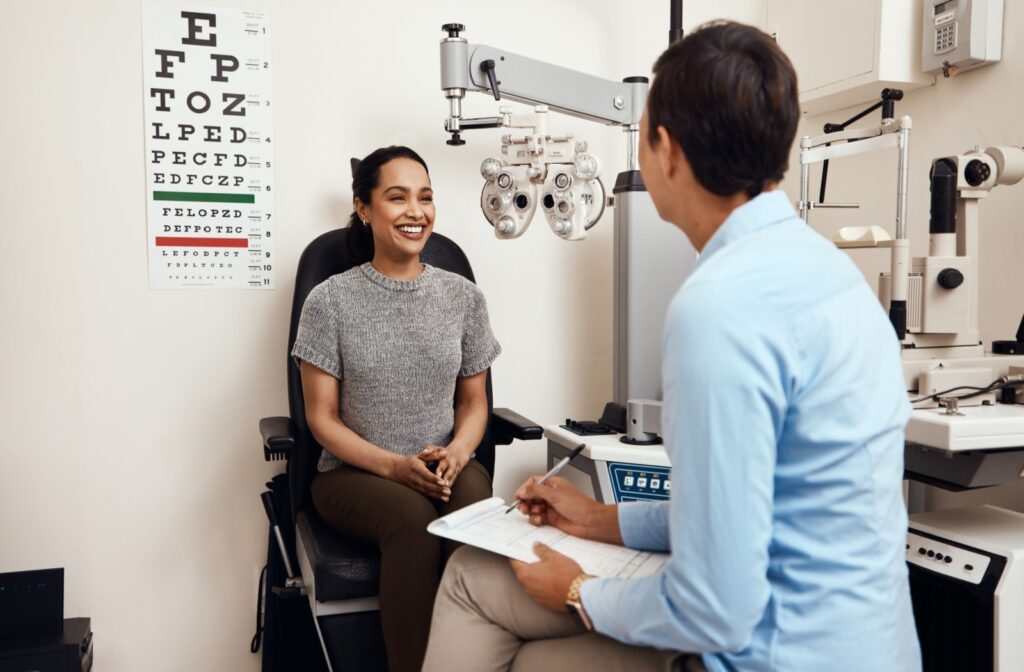Most people think eye exams are only necessary if they wear glasses or have problems with their vision. But this isn’t the case at all.
Everyone benefits from routine eye exams, just like everyone benefits from annual physical exams with their primary care physician or regular check-ins with their dentist.
When it comes to your routine eye exam, the frequency of visits varies depending on a person’s health, family history, and individual visual needs. However, as a general rule:
- Children (18 and under) should have an annual eye exam.
- Adults (19-54) can get by with an eye exam every 2 years.
- Older adults (65+) should have an annual eye exam.
A Routine Eye Exam: Why Have One?
It’s helpful to think of a comprehensive eye exam as the baseline for your visual health. This standard exam goes beyond monitoring your prescription for updated glasses; it also evaluates your overall eye health.
Like any system in your body, your eyes are vulnerable to developing serious concerns.
What makes this particularly challenging is that some eye diseases (glaucoma, macular degeneration) can develop silently, often without noticeable symptoms until the condition (and damage) progresses. Staying on top of routine eye exams means your eye doctor can identify any abnormal changes within the eye early, for timely intervention.
Eye diseases and conditions aren’t the only things your eye doctor is looking out for. Your eyes respond to changes happening within the body, often stemming from general health conditions. In certain cases, your eye doctor may be the first to identify these changes from the retinal portion of the eye exam.
Routine Eye Exams: A General Guideline
Although everyone benefits from eye exams, the frequency of these visits varies based on factors, age being the primary one, since different stages of life bring about different changes.
Here’s a general breakdown of how often people should have a routine eye exam:
- Children (18 and under) should have an eye exam every year.
- Adults (19-64) who are otherwise healthy can get by with an eye exam every 2 years.
- Seniors (65+) are encouraged to have an annual eye exam.
Annual Children’s Eye Exam
Healthy eyes set your child up for success in and outside the classroom.
Children’s eyes grow rapidly, making regular monitoring essential during their early years. The American Optometric Association recommends that children have their first comprehensive eye exam at 6 months of age, followed by another at age 3, and then before starting first grade.
After these initial exams, children benefit from annual visits, regardless of whether they wear prescription lenses. After all, children might have a hard time expressing any visual concerns. For all they know, blurry vision, headaches, or tired eyes are normal.
Adult Eye Exam Frequency
As you get older, the frequency of these visits will change.
Between the ages of 19 and 64, most adults can get by with a routine eye exam every 2 years. This is largely because your eyes stop growing, and any vision prescriptions tend to stabilize at around age 20. Unless, of course, there are specific concerns your eye doctor would like to monitor, or you wear contact lenses. In these cases, they might recommend more frequent visits.
Senior Eye Exams
With age comes experience, wisdom, and plenty of natural changes within the body—your visual health being one of them.
For adults 65 and older, we recommend annual routine eye exams, as this demographic is more susceptible to developing age-related eye conditions, such as cataracts or age-related macular degeneration. The earlier we identify any abnormal changes, the sooner we can take action and preserve your vision.

Factors That Increase Eye Exam Frequency
Not everything is set in stone. This general guideline is helpful, but some people benefit from visiting their eye doctor more frequently for routine check-ups.
Existing Health Conditions
Just as we outlined earlier, certain medical conditions, such as diabetes, can affect your eye health and vision. People with type 1 or type 2 diabetes benefit from annual diabetic eye exams, a comprehensive screening that focuses on monitoring and identifying any diabetic-related changes.
Family History and Genetics
Your genes play a significant role in your eye health.
If you have family members with glaucoma, macular degeneration, or other eye conditions that have a genetic link, your eye doctor may recommend more frequent exams. This is also one of the reasons why we ask patients whether they know of any eye conditions or diseases that run in the family.
If you have the privilege of asking about your family’s medical history, please do! It’s valuable information that can help safeguard your sight.
Current Vision Correction Needs
Everyone’s visual needs are different. Some people prefer wearing contact lenses, while others are fine with glasses. Some people benefit from myopia control therapies, while others have severe dry eyes.
In these cases, frequent eye exams and check-ins allow your eye doctor to confirm your visual health is fine to continue with contact lens wear, or whether your dry eye therapy or myopia control strategies are working as planned.
Signs You Need an Eye Exam Sooner
Guidelines are helpful, but they are just a suggestion. If you’re not due for an eye exam anytime soon, and you’re experiencing vision changes or eye problems, connect with your optometrist right away.
Schedule an eye exam promptly if you notice:
- Blurry or double vision
- Flashes of light
- New floaters
- Eye pain
- Headaches
- Light sensitivity
- Sudden vision loss
Even seemingly minor issues like excessive tearing, dry eyes, or frequent eye infections warrant a professional evaluation.
Making Eye Exams Part of Your Health Routine
Investing your time and energy in your health and wellness is always worth it. Your eyes support you on your daily adventures, so give them the care and attention they deserve by staying on top of your eye health.
If it’s been a while since you’ve sat in the exam chair or it’s time for your routine eye exam, connect with The Eye Gallery team to book an appointment.




